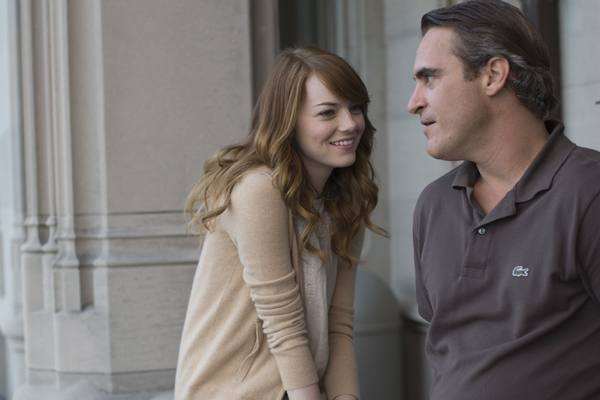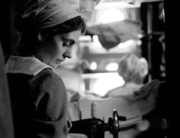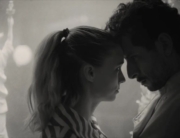Philosophy professor Abe Lucas (Joaquin Phoenix) causes a stir by arriving at Braylin College just in time for the summer session. Abe’s a hot commodity on the campus, the collegiate equivalent of a Lord Byron or James Dean. Rumors fly about his wild past, and he’s widely praised for his writing. Though the dissolute and depressed professor does little more than spout off existentialist clichés and swigs periodically from a flask (lest viewers forget just how disillusioned he is), he still manages to capture the attention of two beautiful and intelligent women (yes, Woody Allen detractors will be eye-rolling right about now). At a faculty party, he meets Rita (Parker Posey), a hot mess of a married chemistry professor so intent on an affair with Abe that she’ll overlook his—metaphorical and literal—impotency.
Though Abe generally finds his students to be a mediocre bunch, there’s one, Jill (Emma Stone), who stands out. Like Juliette Lewis’s Rain in Husbands and Wives, Jill distinguishes herself through a particularly sharp piece of writing, and like Allen’s character in that same film, Abe quickly starts up a friendship with the younger woman, taking her on long walks and sharing his more worldly experiences. While Abe’s initially reluctant to bed his student, smitten Jill offers herself up over and over again, sighing over the man’s clear torment and angst as Roy, her more age-appropriate and level-headed boyfriend (Jamie Blackley), frets over her infatuation with the “charismatic” professor. (The eye-rolling viewers may have transitioned into out and out laughter by this point.)
Things come to a head one day when Abe and Jill overhear a discussion concerning a corrupt judge whose upcoming ruling may end up costing a devoted mother the custody of her children. As Abe begins to mull over whether murdering another human being can ever be justified, he realizes that he’s stumbled upon a way of giving his life meaning, and he begins to emerge from his despondent state. Savvy viewers may be flashing back to Match Point (or even further to 1990’s Crimes and Misdemeanors).
Despite the heavy subject matter, the tone is light, harkening back to Scoop or Manhattan Murder Mystery: a romp with a bit of bloodless murder tossed in. The typical quotable Allen one-liners are absent, but the movie’s not without its charms. A big part of the appeal is the glossy, escapist vibe of the setting. The fictional Braylin, primarily shot on the campus of Salve Regina University in Newport, RI, is lush and impossibly gorgeous. Allen is, admittedly, out of touch with “kids today,” and the film often feels like a college catalog or the wishful thinking of a parent about to pack a child off to university. Jill’s life more closely resembles that of a middle-aged elite New Yorker than a coed (think Diane Keaton and Woody in Manhattan Murder Mystery): piano rehearsals and recitals, dinners with her music professor parents, and even a pleasant but boring relationship that’s hit the skids. Animal House it’s not, but there’s an indulgent pleasure to soaking in the atmosphere.
The acting, too, is solid. Phoenix and Stone do well with parts that aren’t particularly demanding—that in fact border on the stereotypical (jaded professor, plucky and beautiful ingénue). The always excellent Posey, on the other hand, breathes life into her role, giving the desperate Rita a surprising amount of pathos.
However, the film’s often heavy-handed approach at times drags it down. Both Jill and Abe narrate their thoughts in voice-overs. Though Allen has employed this device successfully in the past, here it feels obvious when Abe lets us know that his decision to commit murder makes him feel truly alive or when Jill relates that perhaps she’s more conventional than she thought she was. Allen shoehorns in obvious references to Dostoevsky, which he referred to with far more subtlety in Match Point and Crimes but which now feel tired. These are subjects that the director has tackled in the past with exciting results, but now they come off like old, worn-out toys.
Cribbing liberally from his old works, Allen has crafted an entertaining movie—granted, one with occasionally nail-biting suspense—but ultimately a diluted version of far more successful works.

















Leave A Comment